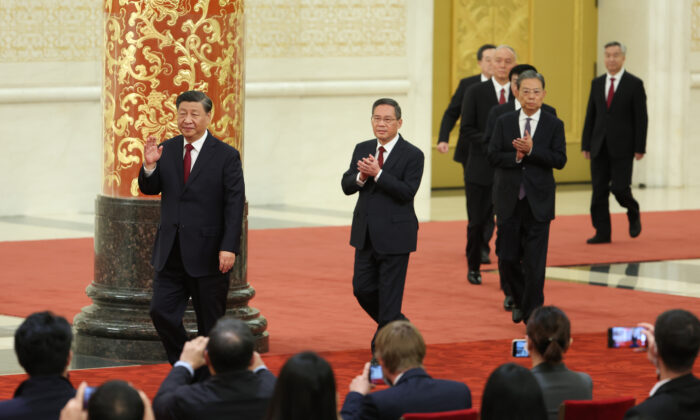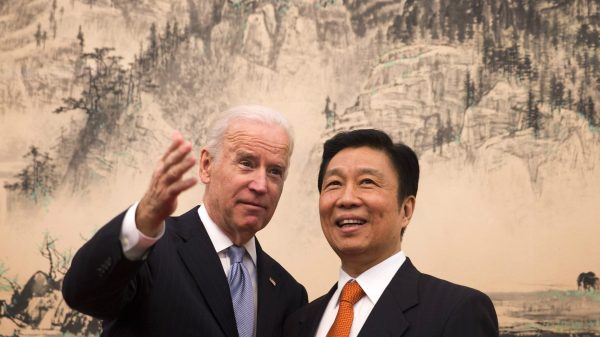
BEIJING, CHINA – OCTOBER 23: Xi Jinping ,Li Qiang, Zhao Leji, Wang Huning, Cai Qi, Ding Xuexiang and Li Xi, attend the meeting between members of the standing committee of the Political Bureau of the 20th CPC Central Committee and Chinese and foreign journalists at The Great Hall of People on October 23, 2022 in Beijing, China. China’s ruling Communist Party today revealed the new Politburo Standing Committee after its 20th congress. (Photo by Lintao Zhang/Getty Images)
Harvard training no longer favorable under Xi
By
At the 20th Party Congress of the Chinese Communist Party (CCP), Chinese leader Xi Jinping unveiled his new picks for the party’s top echelon, the Politburo. A number of members updated their official resumes by either deleting or toning down their foreign education and experience.
The phenomenon of foreign credentials being a taboo for the core leader, Xi Jinping, has been widely suspected since Xi took the power. Consequently, party members’ resumes have become part of a political game, according to one China affairs expert.
In 1998 when Xi’s predecessor, Hu Jintao, was in the office, China launched an overseas training program for its next generation of leaders.
A fellowship called the “New World Harvard Kennedy School Fellows Programme,” dedicated to senior Chinese officials, was agreed and signed between Harvard, Chinese officials, with the liaison of the Hong Kong-based New World Group (NWG).
Each year, the Harvard Kennedy School (HKS) provided four months of fellowship training and an executive course of one to four weeks to 20 Chinese officials.
Up to 2010, NWG reported that 157 Chinese officials benefited from the program.
A Chinese report gave a detailed history of HKS in collaborating training programs for promising Chinese cadres since 1996.
HKS was involved in at least three programs launched in 1998, 2001, and 2005 for senior officials, administrators, and public health sectors respectively, according to the report.
The article stated that at least 1,000 trainees graduated from the program. Since 2002, the program has trained more than 600 officials at the bureau level and above, including many at the provincial and ministerial levels.
Among the many successful political figures were Li Yuanchao, former vice chairman of the Party, and Liu He, the incumbent vice premier and top trade negotiator in the 1998 U.S.-China trade war, said the article.
In a 2013 Beijing forum of Chinese HKS alumni, HKS noted that the school had helped to train more than 1,000 scholars and officials of the CCP through its various programs.

Then-Vice President Joe Biden (L) chats with Chinese Vice Chair Li Yuanchao in Beijing, China, on Dec. 5, 2013. (Andy Wong-Pool/Getty Images)
A Loyalty Issue
Such foreign academic training was a much touted qualification and criteria for officials’ promotion in the CCP before Xi’s era. However, since Xi took power, this experience has become a bit troublesome for those who seek favor under the leadership of Xi Jinping.
Analyst Feng Chongyi said that Xi’s policy to decouple from the West challenges those cadres’ once highly-regarded credentials. Feng is an associate professor of China studies at the University of Technology Sydney in Australia.
He told the Chinese language edition of The Epoch Times on Oct. 30 that it is a loyalty issue.
To Xi, foreign experience suggests an unsettled mind and favor for liberal democratic values, Feng explained.
A typical example would be that of the regime’s former vice chairman, Li Yuanchao.
When Li was the head of the Organization Department, the staffing department of the CCP, between 2007 to 2012, his effort in working with HKS to train promising cadres had the CCP nickname HKS as the “Overseas Party School,” according to a commentary by Radio Free Asia.
However, after Xi took office in 2012, the succeeding head Zhao Leji terminated the program at HKS and Li took an early retirement in 2017.
A similar trend has been observed in the resume of the incumbent Politburo member, Li Hongzhong.
Hongzhong, known as a highly alert political figure, also took training at HKS in July 1999. When Xi promoted him into the Politburo in October 2017, he immediately deleted the HKS training from his resume, which was updated in May 2017.
Another example would be Yuan Jiajun, an aerospace engineer best known for being a chief commander of China’s manned space program, Shenzhou, in 2000. He was trained at the German Aerospace Center.
As one of the newly appointed members of the Politburo at the 20th party congress, Yuan also acted quickly to delete his German training from his official resume.
Haizhong Ning and Luo Ya contributed to this report.